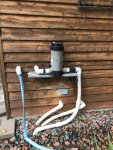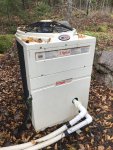Closing an inground pool for first time. Last year I hired pool company and remember they installed duck valves on returns and pushed antifreeze through return lines but I don't remember how they did it. After the sand filter, the line goes through heat pump and then chlorinator and then returning into pool.
I did some research and learned anti freeze shouldn't go into chlorinator. I vaguely remember pool guys used heat pump line to add antifreeze to returns, but I might be wrong. Since I haven't added chlorine pucks in chlorinator for a month now, I am wondering if it would be safe to put chlorinator knob to 0 (zero) and pass antifreeze through chlorinator into returns.
Below is the setup and pictures of pump and setup.
One main drain, one skimmer, two returns, sand filter, chlorinator
I did some research and learned anti freeze shouldn't go into chlorinator. I vaguely remember pool guys used heat pump line to add antifreeze to returns, but I might be wrong. Since I haven't added chlorine pucks in chlorinator for a month now, I am wondering if it would be safe to put chlorinator knob to 0 (zero) and pass antifreeze through chlorinator into returns.
Below is the setup and pictures of pump and setup.
One main drain, one skimmer, two returns, sand filter, chlorinator



